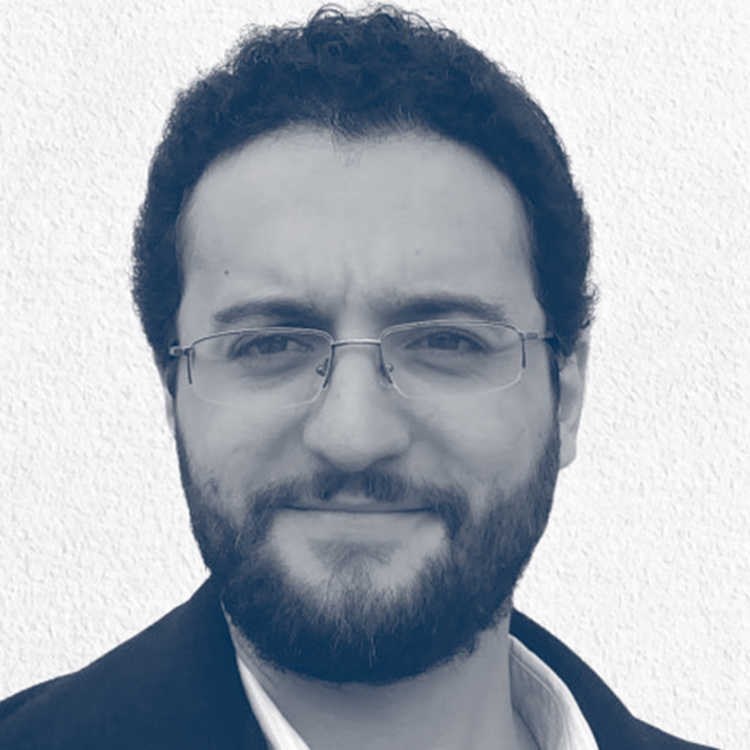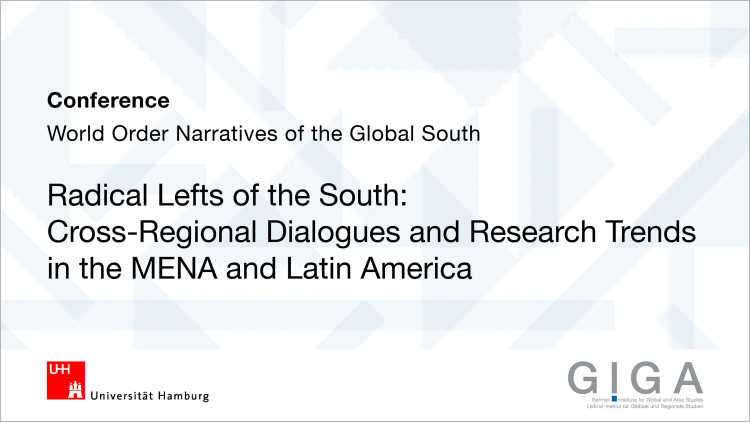- Startseite
- Forschung & Transfer
- Forschungsprojekte
- World Order Narratives of the Global South, Phase I
World Order Narratives of the Global South (WONAGO)
The decades since the late twentieth century are marked by the end of the bipolar world order and the rise of countries of the Global South. Most explanations focus on political and economic power shifts and do not pay much attention to ideas of order, especially those prevalent in the Global South. To provide a more inclusive perspective, this project researches world order narratives in Latin America, Africa, Middle East and Asia. It is funded by the Federal Ministry of Education and Research as part of its Area Studies strategy.
BMFTR, 2021-2024
Team
Kooperationspartner
Forschungsfragen
World order narratives are powerful representations and interpretations of global order and conflicts that posit and define the role of one's own country, region and/or culture. The following questions are at the heart of this project:
- What views on global developments and problems are articulated in the world regions ?
- Do these views differ between countries and regions?
- Are there narratives of the South that are distinct from those of the North (and East)?
- What views on global developments and problems are articulated in the world regions ?
- Do these views differ between countries and regions?
- Are there narratives of the South that are distinct from those of the North (and East)?
Beitrag zu internationaler Forschung
Today, research in the humanities and social sciences on the world's regions faces the challenge of adequately taking into account the significance of the Global South, freeing itself from colonially shaped patterns of thought, remaining methodologically compatible and at the same time developing area-specific expertise. When interpreting the global upheavals of recent decades, it is therefore of paramount importance to take greater account of developments in the Global South.
The project researches world order narratives and strengthens the cooperation of the area studies in Hamburg and between Hamburg and the areas. It contributes to the further advancement of Area Studies in Germany and internationally.
The project researches world order narratives and strengthens the cooperation of the area studies in Hamburg and between Hamburg and the areas. It contributes to the further advancement of Area Studies in Germany and internationally.
Forschungsdesign und Methoden
World order narratives are understood as explicitly formulated concepts that articulate power and interests in a way that connects them with ideas about the global position of a country and/or a region. The project is divided into two subprojects.
Sub-project 1 is located at the University of Hamburg and researches world order narratives in Latin America and in sub-Saharan Africa with their respective global connections. Sub-project 2 is located at the GIGA and researches world order narratives in Asia and the Middle East and North Africa, with their respective global connections.
In close cooperation with the partner institutions in Asia and the Middle East and North Africa (MENA), sub-project 2 starts with drafting and discussing a research design. After that, our post-doctoral researchers in the team pursue research for several months in Asia and the MENA region. In a third phase of subproject 2, the findings of the research stays are analysed in Hamburg and in cooperation with the partner institutions, followed by the drafting and publication of the results. All these steps are accompanied by periodic workshops and meetings in which colleagues of sub-projects 1 and partners from Hamburg and from the areas meet and discuss the research project’s progress.
Additionally, during the entire duration of the project public relations and transfer activities will be carried out to inform the public and decision makers about the project’s results. Project partners from Asia and the MENA region participate in these activities. Together with sub-project 1, the project will prepare and publish a book in the second phase of the three years project period.
Sub-project 1 is located at the University of Hamburg and researches world order narratives in Latin America and in sub-Saharan Africa with their respective global connections. Sub-project 2 is located at the GIGA and researches world order narratives in Asia and the Middle East and North Africa, with their respective global connections.
In close cooperation with the partner institutions in Asia and the Middle East and North Africa (MENA), sub-project 2 starts with drafting and discussing a research design. After that, our post-doctoral researchers in the team pursue research for several months in Asia and the MENA region. In a third phase of subproject 2, the findings of the research stays are analysed in Hamburg and in cooperation with the partner institutions, followed by the drafting and publication of the results. All these steps are accompanied by periodic workshops and meetings in which colleagues of sub-projects 1 and partners from Hamburg and from the areas meet and discuss the research project’s progress.
Additionally, during the entire duration of the project public relations and transfer activities will be carried out to inform the public and decision makers about the project’s results. Project partners from Asia and the MENA region participate in these activities. Together with sub-project 1, the project will prepare and publish a book in the second phase of the three years project period.
Vorläufige Ergebnisse
The most important results of the joint project can be summarized in four points. First, world order narratives do not simply reflect a supposedly existing world order, but are rather powerful narratives that are highly dependent on the location or point of view of the narrating subject. In order to perceive, describe and analyze world order narratives, it is therefore essential to understand such narratives as an expression of a specific, locally or regionally anchored point of view. The starting point for dealing with such narratives must not be a preoccupation with "the world" but, on the contrary, a deeper understanding of specific actors who do not necessarily have a supra-regional influence. The enormous differences between the various narratives only became visible through the very different expertise within the network. The narratives examined are based on the construction of an order and this construction is linked to culture, political convictions, social positions and many other factors. The "provincialization of Europe", or perhaps better: of the "West", means with regard to world order narratives that not only is there no longer a globally hegemonic narrative, but also none that is not questioned in a world region or even just a sub-region. However, it would be wrong to conclude that this means nothing more than that we are living in a quasi second order multipolar world.
Secondly, despite the heterogeneity and variety of world order narratives, the empirical findings allow the conclusion that in those countries referred to here as the Global South, the emergence of today's world order is generally understood differently than in Europe and the USA. According to the prevailing ideas in Europe and the USA, the Second World War was followed by the Cold War, which ended in 1989/90 with the collapse of the Soviet Union and the Eastern Bloc. Today, we are therefore living in the post-Cold War era, which can be described as the "end of history", the "clash of civilizations", a multipolar world or a new age of superpowers (USA and China). For various world order narratives of the Global South, however, 1989/90 is not the decisive turning point, so that the world is not in the era of "after 1989/90". Rather, the caesuras or continuities lie in colonialism and its legacy, in the independence of formerly colonized countries, in the struggle of poor countries against an industrialized North, in the rise of a number of medium-sized superpowers or in the growing importance of Islam. Depending on which aspects are emphasized, a different time and world order emerges. For this reason, the idea of a "turning point" due to the war in Ukraine is not shared in many places. Rather, the war in Ukraine can also be inscribed in a narrative of the old struggle against the expansion of Europe and the USA.
Thirdly, these different ideas about the character and historical moment of today's world order also give rise to very different narratives about the way in which the various actors interact on the world stage. As a rule, this interaction is understood as a kind of "weaponized interdependence". This does not refer to the concept in the narrower theoretical sense, but rather to the idea that every type of relationship between the different actors in the world order is geared towards, or at least implicitly contributes to, strengthening one side or the other in the competition with each other. Every relationship, at whatever level, is therefore seen as a zero-sum game in which the sole aim is to increase one's own power. It is clear that this idea is diametrically opposed to the concept of a value- or rule-based order. However, it is not only opposed to such a conception, but also claims that this conception of values and rules only serves to legitimize the power struggle. Speaking of rules and values would therefore be a part of weaponized interdependence that lies in the realm of culture or propaganda, and not a serious alternative to the idea that the world order is solely about questions of power.
Fourthly, the joint project thus contributes to a better understanding of the global reactions to the Russian war of aggression in Ukraine. Even if the policies of the EU and the USA with regard to Ukraine before February 2022 were understood as expansionist, Russia's invasion would have to be rejected as contrary to international law and, in the way it was carried out, as a crime against humanity. Nevertheless, perceptions and narratives that express great understanding or sympathy with Russia's actions are not only emerging in states that are allied or friendly with Russia. As these narratives are not only formulated at government level, but are also very popular among the population in many countries, they cannot primarily be understood as an expression of foreign policy realism aimed at strengthening the power position of one's own state. They are also an expression of the idea outlined above, according to which all interactions can be described as a power struggle within the existing world order. The reference to international law or human rights is therefore not taken seriously by broad sections of the population. This is particularly true where the USA and Europe are seen as symbols of colonialism and exploitation. The reactions of many states, some of which tend to be rather dismissive, are therefore certainly supported by the population. This also depends on the control or freedom of the media. However, it would be a mistake to assume that this is merely a case of missing or incorrect information. The importance of Russian propaganda should also not be overestimated. Although Russia succeeds in presenting its view of things to a broad audience in many countries, the success or failure of these representations is to a large extent the result of existing world order narratives.
Secondly, despite the heterogeneity and variety of world order narratives, the empirical findings allow the conclusion that in those countries referred to here as the Global South, the emergence of today's world order is generally understood differently than in Europe and the USA. According to the prevailing ideas in Europe and the USA, the Second World War was followed by the Cold War, which ended in 1989/90 with the collapse of the Soviet Union and the Eastern Bloc. Today, we are therefore living in the post-Cold War era, which can be described as the "end of history", the "clash of civilizations", a multipolar world or a new age of superpowers (USA and China). For various world order narratives of the Global South, however, 1989/90 is not the decisive turning point, so that the world is not in the era of "after 1989/90". Rather, the caesuras or continuities lie in colonialism and its legacy, in the independence of formerly colonized countries, in the struggle of poor countries against an industrialized North, in the rise of a number of medium-sized superpowers or in the growing importance of Islam. Depending on which aspects are emphasized, a different time and world order emerges. For this reason, the idea of a "turning point" due to the war in Ukraine is not shared in many places. Rather, the war in Ukraine can also be inscribed in a narrative of the old struggle against the expansion of Europe and the USA.
Thirdly, these different ideas about the character and historical moment of today's world order also give rise to very different narratives about the way in which the various actors interact on the world stage. As a rule, this interaction is understood as a kind of "weaponized interdependence". This does not refer to the concept in the narrower theoretical sense, but rather to the idea that every type of relationship between the different actors in the world order is geared towards, or at least implicitly contributes to, strengthening one side or the other in the competition with each other. Every relationship, at whatever level, is therefore seen as a zero-sum game in which the sole aim is to increase one's own power. It is clear that this idea is diametrically opposed to the concept of a value- or rule-based order. However, it is not only opposed to such a conception, but also claims that this conception of values and rules only serves to legitimize the power struggle. Speaking of rules and values would therefore be a part of weaponized interdependence that lies in the realm of culture or propaganda, and not a serious alternative to the idea that the world order is solely about questions of power.
Fourthly, the joint project thus contributes to a better understanding of the global reactions to the Russian war of aggression in Ukraine. Even if the policies of the EU and the USA with regard to Ukraine before February 2022 were understood as expansionist, Russia's invasion would have to be rejected as contrary to international law and, in the way it was carried out, as a crime against humanity. Nevertheless, perceptions and narratives that express great understanding or sympathy with Russia's actions are not only emerging in states that are allied or friendly with Russia. As these narratives are not only formulated at government level, but are also very popular among the population in many countries, they cannot primarily be understood as an expression of foreign policy realism aimed at strengthening the power position of one's own state. They are also an expression of the idea outlined above, according to which all interactions can be described as a power struggle within the existing world order. The reference to international law or human rights is therefore not taken seriously by broad sections of the population. This is particularly true where the USA and Europe are seen as symbols of colonialism and exploitation. The reactions of many states, some of which tend to be rather dismissive, are therefore certainly supported by the population. This also depends on the control or freedom of the media. However, it would be a mistake to assume that this is merely a case of missing or incorrect information. The importance of Russian propaganda should also not be overestimated. Although Russia succeeds in presenting its view of things to a broad audience in many countries, the success or failure of these representations is to a large extent the result of existing world order narratives.













